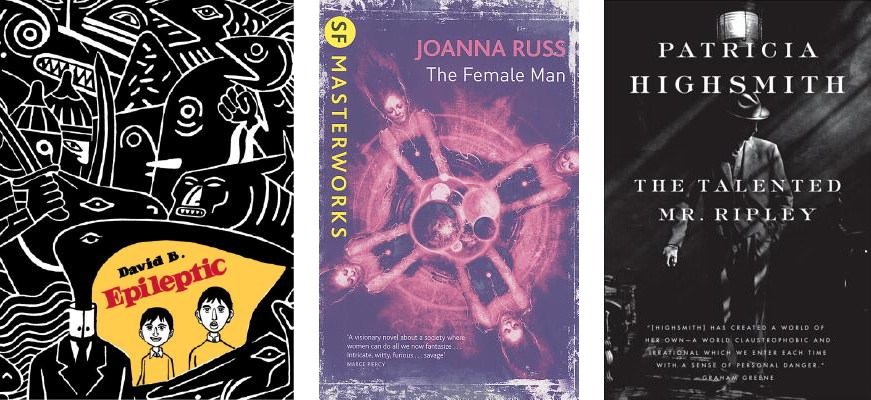Whatcha Reading, Michael Hobbes?
Every week we ask an interesting figure what they're digging into. Have ideas who we should reach out to? Let it fly: info@seattlereviewofbooks.com. Want to read more? Check out the archives.
Michael Hobbes is a Seattle-based journalist, writer, and supremely-talented untangler of our culture's messiest cultural hairballs. He is the other half (the first being Sarah Marshall, who did this column last week) of the most wonderful You're Wrong About, a podcast that absorbs every superlative I throw its way, and leaves me wanting to praise it still more. Let's just say it's really good and you should listen to it. Michael's bylines include Slate, NPR, Pacific Standard, The New Republic, and his primary home for long-form writing, The Huffington Post. An enjoyable, and enlightening, afternoon can be spent perusing his published articles.

What are you reading now?
I've loved graphic novels since I was a kid. One of my favorite summer activities is buying one at a used bookstore, then sitting in a park and reading it all at once. The other day I came across David B’s Epileptic, which I read years ago and adored. I had given away my copy so I bought it again, biked to Greenlake and read about half of it.
It’s a memoir about a family trying to cure their son’s epilepsy. After they get frustrated with doctors, they start hiring psychics and subjecting their kids to weirder and weirder diets. Eventually, they join a cult and move into the woods.
The book takes place in France in the 1970s, but it's human enough to feel time- and place-less. Reading it, I kept thinking of the episode Trust Issues did last year on these resorts in Florida that advertise swimming with dolphins as a cure for autism. Parents pay thousands of dollars to get their kids a few minutes of swimming time. Many of them come away convinced that it works, but their kids didn't get enough. Or that their own behavior reversed the results somehow.
Epileptic tells this story from the inside. It's hard for people to come to grips with conditions they don't experience themselves, and even harder to accept that there's no 'normal' they can ever return to.
What did you read last?
Last month my book club read Joanna Russ’s The Female Man. It was published in 1975 and is considered one of the first feminist sci-fi novels. At the time, writers were starting to put female characters into science fiction stories, but their female-ness was often sidelined. Their actions weren’t explicitly informed by their experiences as women and their gender never led them to be angry or — gasp — “radical” in their political beliefs.
Russ was not having any of that shit. Her book takes place in four parallel universes, one of which is a utopia in which men have been wiped out and women live together in peace. The story begins when a character from this all-female Xanadu — an out lesbian, another thing Russ refuses to apologize for — visits Earth and starts pointing out all the ways the women there are being abused and belittled by men.
It’s a difficult book to read because it bounces around in time and dimension and character, but it’s fascinating for how openly angry it is. Later, Russ wrote a non-fiction book called “How to Suppress Women’s Writing.” It gives men all these rules for casting female artists as not-really female and their best work as not-really-masterpieces. Both books are 30-odd years old but they still feel urgent.
What are you reading next?
Speaking of old stories and gayness, I got super obsessed with the Thomas Ripley books this summer and can’t wait to finish the series.
I’ve always had a weird relationship with the story. As a teenager, I saw “The Talented Mr. Ripley” knowing nothing about it except that Matt Damon and Jude Law were hot on the posters. None of the movie’s trailers had indicated that it had any gay characters, so I thought it was a safe movie for me, a deeply closeted senior in high school, to suggest to my straight friends.
Most of the other people in the theater had apparently come in equally unfamiliar with the story. As soon as Tom started trying on Dickie’s clothes, the walkouts started. By the time Matt Damon (spoiler) killed Jude Law and embraced his dead body, probably a quarter of the theater had left. People were shouting at the screen. I was terrified my friends would suspect I was gay because I had suggested it. Since then I've never been able to rewatch it because it's always been this perfect little symbol of why I stayed in the closet for so long.
But then a friend suggested the series and I devoured the first two books. They’re amazing. They came out 44 years before the movie, so the homosexuality is a lot more subtle. Nonetheless, they’re a painfully specific portrait of the exact alienation I had experienced in that movie theater in 1999.
Tom feels profoundly alone; he falls in love recklessly; he changes locations and friendships and identities thinking he’s one change away from fixing the emptiness he feels. It was everything I heard when I interviewed therapists and experts on minority stress, but it’s a suspense thriller written when Dwight Eisenhower was president. It’s so magical to feel a connection to the past through fiction like that.
So anyway, I need to finish the series! I also need to try watching the movie again. Partly because I’m ready to revisit that part of my life but mostly because I still think Matt Damon and Jude Law look hot on the poster.